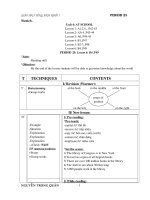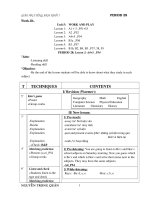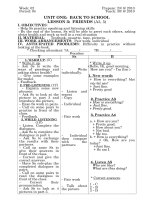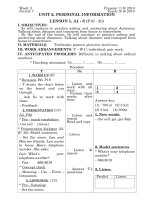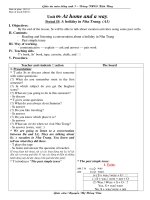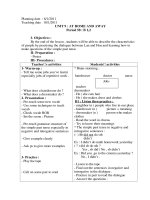- Trang chủ >>
- Văn Mẫu >>
- Văn Thuyết Minh
anh 7 tuan 36
Bạn đang xem bản rút gọn của tài liệu. Xem và tải ngay bản đầy đủ của tài liệu tại đây (139.63 KB, 6 trang )
TRƯỜNG THCS LIÊNG TRANG
1.
The basic tenses:
tense
Simple present
(hiện tại đơn)
ĐỀ CƯƠNG ÔN TẬP HK II
A. THEORY:
form
I/ you/ we/ they + V(0)
he /she /it/ Lan… + V(s/es)
Present continuous
tense
(hiện tại tiếp diễn)
Simple future tense
(tương lai đơn)
Simple past tense
( quá khứ đơn)
S + am/ is/ are + V-ing
- She is reading a book now
- They are playing badminton
S + will + V(0)
- We will have a great summer vacation
(+) S + V2/ed
(-) S + didn’t + V.
(?) Did + S + V?
Yes, S did. / No, S didn’t.
(?) Wh- + did + S + V?
S + V-ed/2
* Một số động từ ở thì quá khứ đơn:
Infinitive
be
take
have
buy
go
put
eat
drink
do
see
think
wear
give
send
teach
cut
make
get
put
tell
keep
leave
Past
was / were
took
had
bought
went
put
ate
drank
did
saw
thought
wore
gave
sent
taught
cut
made
got
put
told
kept
left
Infinitive
return
talk
visit
change
polish
iron
look
remember
stop
arrive
help
rent
borrow
decide
fit
learn
watch
brush
comb
shower
wash
stir-fry
adverbs
always( luôn luôn), usually( thường
thường), often( thường hay),
sometimes( đôi khi), never (không
bao giờ), every (mỗi)
now, right now, at present, at the
moment…(bây giờ, ngay lúc này)
tomorrow, next week, next monh,
next year…………….
ago, last, yesterday, in 1999, ….
Past
returned
talked
visited
changed
polished
ironed
looked
remembered
stopped
arrived
helped
rented
borrowed
decided
fitted
learned
watched
brushed
combed
showered
washed
stir-fried
2. So, too, either, neither:
a. So, too:(cũng vậy) được sử dụng trong câu khẳng định
+ So đứng ở đầu câu: So do I
+ Too đứng ở cuối câu: I like bananas, too
b. Either, neither: (cũng không) được sử dụng trong câu phủ định
+ Neither đứng ở đầu câu: Neither do I
+ Either đứng ở cuối câu: I don’t like bananas, either.
3. Modal verbs: (động từ khiếm khuyết) can, must,should, ought to + V(0)
Can
S
+ Should
+ V(0)
Ought to
Infinitive
call
fill
measure
start
stop
weigh
Past
called
filled
measured
started
stopped
weighed
Must
Ex: She can swim.
a. Can: Có thể (can’t: khơng thể)
+ Can diễn tả khả năng
Ex: She can speak English.(Cô ấy có thể nói tiếng Anh)
b. Should = ought to: nên (diễn tả lời khuyên)
Ex: You should go to bed early.(Bạn nên đi ngủ sớm)
c. Must = have to: phải ≠ (mustn’t)
+ Must: phải (diễn tả sự bắt buộc)
+ Mustn’t: Không được (diễn tả sự cấm đoán)
- The traffic lights are red. You must stop.(Đèn đỏ.Bạn phải dừng lại)
- You mustn’t forget to finish your homework before watching TV. (con không được quên làm bài tập về nhà
trước khi xem tv)
4. adverbs and adjectives:(trạng từ và tính từ )
- adj :(tính từ) + bổ nghĩa cho danh từ
+ thường đứng sau động từ tobe hoặc đứng trước danh từ mà nó bổ nghĩa.
+ ex: He is a slow swimmer
- adv (trạng từ) + bổ nghĩa cho động từ.
+ ex: he swims very slowly
5. like (thích), prefer (thích hơn)
like + Ving
I like watching TV.
like to + V(0).
I like to watch TV.
Prefer + to-V / V-ing
I prefer watching TV to swimming. (tơi thích xem Tivi hơn đi bơi)
6. Why (tại sao) → because: (bởi vì):
Nam: Why did you get up late ?
Ba: Because I stayed up late last night
7. Comparatives of adjectives:
More …than (nhiều… hơn) + N (không đếm được/số nhiều) : more books, more water
Fewer .. than (ít…hơn) + N (đếm được số nhiều) : fewer friends, fewer books
Less… than (ít…hơn) + N (không đếm được) : less coffee, less milk
8. Suggestion (đề nghị, rủ ai đó làm gì)
Making suggestions
Reply
- Would you like to + V(0)
- Yes, I’d love to/ I’d love to but I can’t/
- What about + V-ing
- Sorry. I can’t. I’m busy
- Let’s + V(0)
- OK, Let’s…..
- How about… ?
- That a good idea/ Great
Ex:
- Would you like to have a drink ?
- Yes, I’d love to.
10. How far ?: bao xa
A: How far is it from here to the nearest post office ?
B: It’s about 2 kilometers
11. How much ? : giá bao nhiêu
A : How much is this book ?
B: it’s two thousands dong
A : How much are they ?
B: They are ten thousands dong.
12. Vocabulary:
- Unit 9- At home and away: aquarium: viện hải dương học; souvenir: quà lưu niệm; gift: quà; shark: cá mập;
dolphin: cá heo; turtle: rùa; the exit of: lối ra của; poster: tấm áp phích; crab: con cua; instead: thay thế; mine:
của tôi; next-door: kế bên; move: chuyển; improve: cải thiện; hairdresser: thợ làm tóc; material: chất liệu;
clever: khéo léo, dressmaker: thợ may; sew: may; useful: có ích; hobby: thói quen; decide: quyết định; sewing
machine: máy may; cushion: đệm gối; fit: vừa; try on: mặc thử
- Unit 10- Health and hygiene: nearly: gần đến; harvest time: thời gian thu hoạch; hear: nghe; iron: ủi; stay up
late: thức khuya; probably: có lẽ; receive: nhận; take morning exercises: tập TD buổi sáng; so: vì vậy; forget:
quên; put on: mặc vào; polish: đánh bóng; put … in: đặt … trong; change: thay đổi; pants: quần; a toothache:
răng đau; dentist: nha sĩ; an appointment: 1 cuộc hẹn; soun (n): âm thanh; the drill: cái khoan; a cavity: lỗ sâu;
uniform: đồng phục; advice: lời khuyên; scared: sợ; loud: to; kind: tử tế; afterwards: sau đó; less: ít hơn;
1.
2.
3.
4.
5.
6.
regularly: thường xuyên; sensibly: hợp lý; look after: chăm sóc; fix: sửa; fill the cavity: trám lỗ sâu; hate:
ghét; hurt: làm đau; remind: nhắc; explain: giải thích; surgery: phịng khám; serious: nghiêm trọng; smile at:
mỉm cười; healthy: khỏe mạnh; notice: chú ý
- Unit 11- Keep fit, stay healthy: a medical check-up: buổi kiểm tra sức khỏe; a medical record: phiếu khám
sức khỏe; take one’s temperature: đo nhiệt độ; height: chiều cao; measure: đo; scale: cái cân; male: nam;
female: nữ; weight: cân nặng; have a bad cold: bị cảm lạnh; have a headache: bị đau đầu; have a virus: bị sốt
virut; have stomach-ache: bị đau bụng; have flu: bị cúm; write a sick note: viết giấy nghỉ ốm; be absent from:
vắng; semester: học kì; relieve: làm giảm; prevent: phịng ngừa; common symptom: triệu chứng thông
thường; a slight fever: sốt nhẹ; sneeze: hắt hơi; cough: ho
- Unit 12- Let’s eat!: spinach: rau chân vịt; cucumber: dưa leo; durian: sầu riêng; papaya: đu đủ; (to) smell:
ngửi; bowl: cái bát; dish: dĩa; soy sauce: xì dầu; slice: xắt lát; stir-fry: xào; add: thêm
- Unit 13- Activities: skateboarding: trượt ván; roller-skating: trượt patinh (giày bánh xe ngang); rollerblading: trượt patinh (giày bánh xe dọc); football (American football): bóng bầu dục; baseball: bóng chày;
increase: tăng; participant: người tham gia; organize: tổ chức; take part in: tham gia; win the prize: thắng giải;
competition: cuộc thi; ought to: cần; a table tennis paddle: vợt bóng bàn; spare: dư; underwater: dưới nước;
vessel: tàu ngầm; explore: thám hiểm; invent: phát minh; special breathing equipment: thiết bị thở đặc biệt
- Unit 14- Freetime fun: adventure: cuộc phiêu lưu; cricket: con dế; series: phim nhiều tập; guess: đoán; a
cowboy movie: phim cao bồi; detective: thám tử; owner: thám tử; gather: tụ tập; kind: loại; cartoon: phim hoạt
hình; sport show: chương trình thể thao; weather forecast: dự báo thời tiết
- Unit 15 – Going out: the amusement center: trung tâm giải trí; addictive: gây nghiện; the arcade: khu vui
chơi; dizzy: chóng mặt; inventor: người phát minh; the rest of: phần còn lại; awake: thức giấc; get used to:
quen với; rarely: hiếm khi
- Question words: What: gì; Where: ở đâu; When: khi nào; Who: ai; How many: bao nhiêu?; How: như thế
nào?; How old: bao nhiêu tuổi; Which: nào?; How long: bao lâu?
B. EXERCISES:
I. LISTENING:
1. Listen and check (X) for True or False statements:
STATEMENTS
TRUE
FALSE
Nam is going to the amusement
Nam is going there to play video games
Nam goes to the amusement center twice a week
Video games can not be addictive
Nam has a lot of homework
Nam plays game for a long time
2.Listen and fill in the blanks with the given words:
scared
advice
reminds
washes
looks after
regularly
explains
Dr. Lai is a dentist at Quang Trung school. She (1)………… all the student’s teeth. Dr.Lai’s office is
clean and so is her uniform. She always (2) …………. her hands after each child leaves. Many children are
(3)…………. when they come to see Dr.Lai, but she is a kind woman. She (4)…………. what will happen so
they are not afraid.
Dr.Lai gives the children (5)…………. . She tells them how to look after their teeth and she reminds
them to clean their teeth (6)…………. and eat sensibly
3. Listen and put the sentence in order you hear
a. She went to school.
b. She went to bed at 11 o’clock.
c. She put on clean clothes.
1
d. She had her breakfast and then she brushed her teeth.
e. She did her homework.
4. Listen and match.
rice
nooles
fish
beef
vegetables
fruit
juice
water
Lan
Ba
Nga
Hoa
5. Listen and and write T (true) or F (false)
1. Thirty years ago in Viet Nam, many people had TV sets.
2. People watched color TV programs at that time.
3. Everyone often gathered to watch TV after dinner.
4. The older people and the children would not go home until the
TV programs finished.
5. Today, many families have a TV at their houses.
6. Today, Many neighbors spend much time watching TV together.
II. READING
A.
Even before it is born, a baby has small teeth under its gums. At about the age of six months, its first
tooth starts to grow. Before the young child is three years old, it has twenty small teeth. Between the ages of
six and twelve a second set of teeth form in the gum bellow the first teeth and push them out.
T
F
1. A baby has teeth under its gums even before its birth.
2. A baby’s first tooth appears as soon as it is born.
3. A three-year-old child has twenty tiny teeth.
4. A child’s second set of teeth appear before it is six years old.
B.
Nowadays, football becomes one of the world’s most popular games. Millions of people play and
watch it all around the world. A football match often has two parts. Each part is forty-five minutes. The first
part is the half and the second part is the second half. There is a fifteen-minute break beteen the two halves.
There are two teams in a football soccer match. Each football team has eleven players, including a goalkeeper. The players on the ground try to kick the ball into the other’s goal. The team which scores more goals
wins the match.
True False
1. Today, football is a popular sport all around the world.
1. 2. A football match often has two halves of forty-five minutes each
2. 3. There is no break in a football match.
3. Each football team has eleven players and a goal-keeper in the field.
C.
How can we keep our teeth healthy?
Firstly, we ought to visit our dentist twice a year. He can fill the small holes in our teeth before they
destroy the teeth. He can examine our teeth to check that they are growing in the right way. Unfortunately,
many peole wait until they have toothache before they see a dentist.
Secondly, we should brush our teeth with a toothbrush and fluoride toothpaste at least twice a day –
once after breakfast and once before we go to bed. We can also use wooden toothpicks to clean between our
teeth after a meal.
Thirdly, we should eat food that is good for our teeth and our body such as milk, cheese, fish, brown
bread, potatoes, red rice, raw vegetables, and fresh fruit. Chocolate, sweets, biscuits and cakes are bad,
especially when we eat them between meals. They are harmful because they stick to our teeth and cause
decay.
1.How often should we visit our dentist a year?
............................................................................................................................................................
2.What should we brush our teeth with?
............................................................................................................................................................
3.What else we can use to clean between our teeth after a meal?
............................................................................................................................................................
4.What kinds of food are good for our teeth?
............................................................................................................................................................
5. Are sweets good for our teeth?
...........................................................................................................................................................
D.
In the summer holidays, Mr. Nam, Mrs. Nga and their children, Mai and Hung often go to the beach
for two or three days. They always go to Vung Tau in the South of Viet Nam. They rarely go to the North.
They usually stay in a small house or a flat by the sea, but sometimes they stay in a hotel. Last summer, they
went to Nha Trang. They stayed at the Sunshine Hotel for four days. In the morning, Hung played soccer with
his father on the beach. Mai and her mother walked along the beach and buit sand castles. They visited Tri
Nguyen Aquarium and saw different kinds of fish there. They felt very comfortable when they came home. It
was a great holiday. They also bought a lot of souvenirs for friends.
1. Where does Lan`s family often go to on their summer vacation?
................................................................................2. How long do they often stay there?
.................................................................................3. Where did they go to last summer?
.............................................................................................................................................
4. What did Mai and her mother do in the morning?
............................................................................................................................................
5. Did they
enjoy their last year holiday?
............................................................................................................................................
B.
Mary came from a rich family and was very pretty. In her family, young girls usually spend their time
going to parties until they married rich young men. But Mary found parties boring; she wanted to be a nurse.
Finally, in 1850, when she was 30, her parents accepted her decision. So she went to study in a hospital in
Germany. Soon she was asked to go to the Japan to take care of the wounded soldiers. Then she was in charge
of a nursing-home for women in London.
1. When was Mary born?
.............................................................................................................................................
2. What was Mary like?
.............................................................................................................................................
3. How did girls in her family spend their free time?
.....................................................................................................4. Did Mary like parties?
.........................................................................................5. What did she do in Germany?
.............................................................................................................................................
E.
are
movies
watching
good
prefer
is
People of different ages have different tastes for TV programs. Young children like (1)______cartoon most.
So there (2)______many kinds of films on children’s corner. Tenagers like sports shows, fashion shows,
(3)______ (often romatic, horror or detective), music (often pop and rock) and sometimes cartoons. But there
are not many (4)______ programs for people of this age. Adults (5)______ to watch the news, reports, movies
and contests. Old people like watching and listening to classical music most. They also watch movies, news
and other programs that suit them.
III. WRITING:
1. Answer the questions about you:
1. Which school are you in?.........................................................................................................................
2. Which class are you in?...........................................................................................................................
3. How tall are you?.....................................................................................................................................
4. What is your weight?...............................................................................................................................
5. What kinds of food and drink do you like?..............................................................................................
6. What is your favorite sport?.....................................................................................................................
7. Do you like table tennis?..........................................................................................................................
8. Did you watch TV last night ?.................................................................................................................
9. What TV programs do you like to watch ?..............................................................................................
10. What are you going to do this evening?...................................................................................................
11. Do you like the city or the countryside?..................................................................................................
12. What do you often do in your freetime ?.................................................................................................
What do you do in your free time?
What are you going to do this evening ?
How often do you watch TV?
What would you like to watch?
Do you prefer to watch music shows or sport shows?
Who do you often watch TV with?
................................................................................................................................................
..................................................................................................................................................
..................................................................................................................................................
..................................................................................................................................................
2. Rearrange the words to make ameaningful sentences:
1. is/very/good/spinach/you/for . ...................................................................................................................
2. can/dirt/make/you/that/sick. . .....................................................................................................................
3. have/should/a/we/diet/balance. . ................................................................................................................
4. soccer/he/is/good/a/player. . .......................................................................................................................
5. you/would/to/like/volleyball/play? . ..........................................................................................................
6. does/Nga/on TV/what/like/watch/to? . ......................................................................................................
7. games/can/Video/addictive/be . .................................................................................................................
8. she/Does/the/like/movies? ........................................................................................................................
3. Rewrite the sentences so that they have the same meaning as the original ones:
1. Why don’t we go to Huong pagoda this summer?
What about...............................................................................................................................................?
2. Noone is taller than Nam in the class.
Nam............................................................................................................................................................
3. This coat is more expensive than that coat.
That coat.....................................................................................................................................................
4. Minh is a good soccer player
Minh plays.................................................................................................................................................
5. What is your height?
How............................................................................................................................................................
6. What is the matter with you?
What is ....................................................................................................................................................?
7. How heavy are you?
What is ...................................................................................................................................................?
8. What about playing soccer this afternoon?
Let's .........................................................................................................................................................?
9. You should not watch TV too late.
You ought .................................................................................................................................................
10. How much does the green coat cost?
How much ...............................................................................................................................................?
11. He is a safe cyclist.
He cycles ...................................................................................................................................................
13. How tall is Nga?
What ........................................................................................................................................................?
14. They can play volleyball.We can play volleyball.
They can play volleyball. So .....................................................................................................................
15. Nam doesn’t like durian. Hoa doesn’t like durian.
Nam doesn’t like durian. Neither ..............................................................................................................

